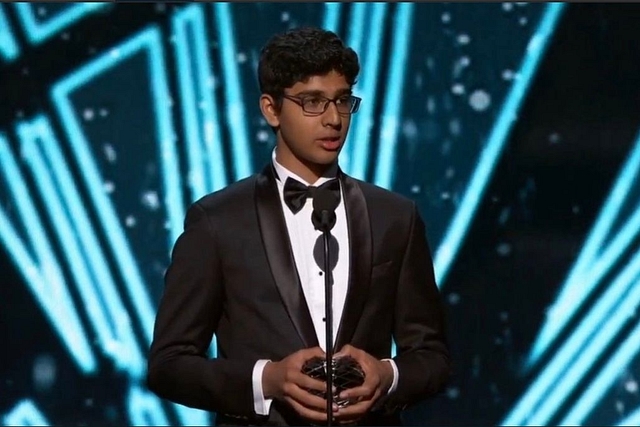
Bengaluru’s National Public School Student Emerges As The Winner Of Rs 2.9 Crore Breakthrough Prize in Science
The Breakthrough Prize today (6 November) announced Samay Godika, 16, a student of the National Public School (NPS), Koramangala in Bengaluru as the winner of the fourth annual Breakthrough Junior Challenge, a global science video competition designed to inspire creative thinking about fundamental concepts in the life sciences, physics, and mathematics.
As the winner, Samay will receive $400,000 (Rs 2.9 crore) in educational prizes for himself, his teacher and his school. Samay will also receive a $250,000 (Rs 1.81 crores) college scholarship.
His ninth and tenth grade science teacher, Pramila Menon, who encouraged his interest in life sciences and tutored him after school to encourage his curiosity about scientific ideas, will also be awarded a $50,000 (Rs 36 Lakhs) prize. Additionally, his school NPS, Koramangala will receive a state-of-the-art science lab valued at $100,000. (Rs 72 Lakhs)
Samay’s video, submitted in the life sciences category, focused on circadian rhythms, the 24-hour biological processes that can affect simple daily experiences such as waking up for school or jet lag. Samay has family members who suffer from Parkinson’s and other neurological diseases, leading to his interest in the correlation between circadian rhythms and the effectiveness of medical treatments.
Samay will be recognised tonight alongside some of the world’s top scientists and mathematicians as they are awarded the world’s most generous science prize, the Breakthrough Prize.
“Participating in and now winning the Breakthrough Junior Challenge is life-changing, thrilling and such an honour,” Samay said. “I’m so grateful for this opportunity to be recognised alongside so many of the world’s top scientists and tech industry leaders.”
Breakthrough Junior Challenge is a global initiative to develop and demonstrate young people’s knowledge of science and scientific principles; generate excitement in these fields; support STEM career choices; and engage the imagination and interest of the public-at-large in key concepts of fundamental science.
All of the videos made by the Breakthrough Junior Challenge finalists were of such quality that they have been added to Khan Academy’s website as teaching tutorials for the world in math and science.
This is the fourth consecutive year in which students ages 13-18 were invited to create original videos (up to three minutes in length) that illustrated a concept or theory in physical or life sciences. The submissions were evaluated on the students’ ability to communicate complex scientific ideas in the most engaging, illuminating, and imaginative ways.
Students from around the globe had to submit their videos by 1 July, 2018. The field was narrowed to 29 semifinalists who competed in the Popular Vote contest in September on the Breakthrough Prize Facebook page, where the public was invited to vote for their favourite semifinalist submission by “liking,” “sharing,” or posting a positive reaction.
This year’s Popular Vote winner was Nikhiya Shamsher, 16 (also of India), whose video on spacetime and gravity garnered more than 25,000 likes, shares and positive reactions on the Breakthrough Facebook page. Nikhiya received automatic entry into the final round of judging. Last year, Samay won the Popular Vote contest.
Since its launch, the Breakthrough Junior Challenge has reached 190 countries, and the 2018 instalment of the global competition attracted more than 12,000 registrants. The contest is designed to inspire creative thinking about fundamental concepts in the life sciences, physics, and mathematics. The field was reduced to 29 semifinalists, which represented the top submissions after two rounds of judging: first, a mandatory peer review, followed by an evaluation panel of judges.
The 2018 Selection Committee included Salman Khan, CEO, Founder, Khan Academy; author and educator Lucy Hawking; Mae Jemison, science literacy expert, former astronaut, and Principal, 100 Year Starship; retired NASA Astronaut Scott Kelly; Nima Arkani-Hamed, Professor of Physics, Institute for Advanced Study and Breakthrough Prize in Fundamental Physics Laureate; Rachel Crane, Space and Science Correspondent, CNN; Huda Zoghbi, Professor of Pediatrics and professor of Neuroscience and Molecular and Human Genetics, Baylor College of Medicine and Breakthrough Prize in Life Sciences Laureate; Ijad Madisch, CEO, Co-Founder, ResearchGate; Pete Worden, Chairman, Breakthrough Prize Foundation, Executive Director, Breakthrough Starshot; Esther Wojcicki, Founder, Palo Alto High Media Arts Center; and Terence Tao, Professor of Mathematics, UCLA and Breakthrough Prize in Mathematics Laureate.